 Newsletter Copywriting – Emails That Convert, Not Bore!
Newsletter Copywriting – Emails That Convert, Not Bore!
Custom Software Development- Why Does Your Business Need It in 2024?
Written by Krishna Padam IT Solution » Updated on: June 17th, 2025

In 2024, the digital revolution continues to develop, making custom software development an essential asset for businesses seeking innovation, agility, and competitive benefit. Since enterprises have increasingly invested in differentiated digital solutions to gain a competitive edge, custom software development has experienced remarkable growth.
As we enter 2025, custom development is balanced to disrupt existing industries by empowering industries with hyper-focused software solutions. This comprehensive guide delves into the core of Custom Software Development:- Why Does Your Business Need It in 2024, exploring its numerous benefits, types, strategic significance, and how it aligns wholly with the requirements of modern businesses.
As Per Statisia:
Revenue in the on-demand Custom Application Development Software is estimated to reach US$179.90bn in 2024.
Forecast revenue is to show an annual growth rate (CAGR 2024-2028) of 6.87%, resulting in a market volume of US$234.70bn by 2028.
In global comparison, most revenue will be developed in the United States (US$91,020.00m in 2024).
What is Custom Software?
Custom software refers to custom applications designed to meet specific business needs. Unlike off-the-shelf solutions, custom software is developed from scratch and can be completely customized to fulfill a business's outstanding provisions.
Also, Custom software usually handles business challenges, streamlines processes, improves efficiency and enhances productivity. It is customized to fit the workflows, preferences, and organization goals, resulting in a solution that aligns perfectly with its strategies and objectives.
What is Custom Software Development?
The process of creating specialized software solutions to meet the unique demands and specifications of a given company or organization is known as custom software development. Custom software is built from scratch and allows for complete customization and alignment with the specific goals and workflows of the client, in contrast to off-the-shelf software, which provides pre-built solutions with generic functionality.
Fundamentally, developing custom software entails considering the customer's business procedures, blotting inefficiencies or potential improvement areas, and then planning and constructing a software solution to meet those needs.
Types of Custom Software Development Solutions
There are various types of custom software development solutions, each serving specific business requirements. Here is the summary of a few standard types:
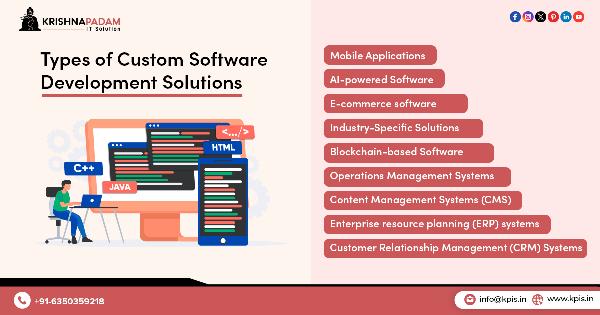
- Enterprise resource planning (ERP) systems- It delivers a compact platform for handling all elements of a business by integrating essential business operations such as accounting, inventory control, human resources, and customer relationship management (CRM) into a single system.
- Customer Relationship Management (CRM) Systems: CRM software allows companies to manage interactions with clients and probable consumers. It optimizes procedures for lead generation, customer support, and sales pipeline management, encouraging stronger relationships and increasing sales.
- Content Management Systems (CMS): Without requiring deep technical expertise, a CMS enables users to generate, update, and publish content on a website or online application. It is excellent for businesses that have to add new information to their website, such as blog articles, product descriptions, or notifications of events.
- E-commerce software: E-commerce platforms help businesses make sales online by letting them set up a storefront, maintain product listings, safely accept payments, and fulfil the demands of the customers.
- Operations Management Systems: These solutions assist organizations in increasing productivity, optimizing resource usage, and streamlining internal procedures. They may include functionalities such as supply chain management, inventory control, task scheduling, and project management.
- Industry-Specific Solutions: Bespoken Custom software can manage the specific requirements of an established industry. A manufacturing company would develop a solution to improve production lines and maintain inventory levels, whereas a healthcare provider might create software applications to handle patient information and visits.
- Mobile Applications: It can be built to boost client interaction, offer services while on the go, or increase internal company communications.
- AI-powered Software: Tailored software solutions that use machine learning (ML) and artificial intelligence (AI) to forecast outcomes, automate processes, and offer tailored recommendations. With the help of these AI software programs, businesses may use AI to improve decision-making and optimize operations.
- Blockchain-based Software: Using this technology, you can track assets, secure transactions, and build trust in decentralized networks. Applications for these software programs are built-in supply chain management, healthcare, finance, and other fields.
It is not comprehensive, but it demonstrates the versatility of custom software development. By comprehending the many kinds of solutions that are accessible, companies can choose the strategy that best aligns with their unique ideals and requirements.
Difference Between Custom Software and Off-the-Shelf Software
Custom software and off-the-shelf software serve different purposes and come with their benefits and regulations. Comprehending the differences between them can help industries make informed decisions when choosing suitable solutions for their necessities.
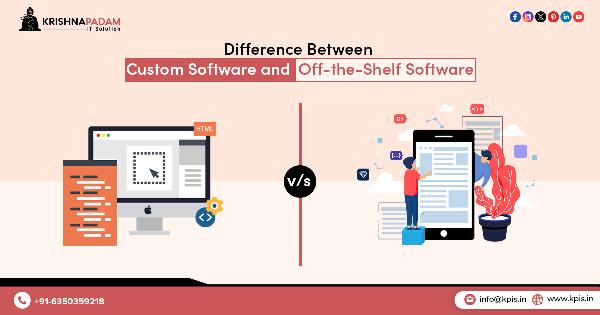
Tailored vs. Generic Solutions
- Custom software is created from the ground up to fulfill business requirements and handle specific difficulties and procedures. It provides customized features and functionalities that closely match the goals and workflows of the organization.
- Off-the-Shelf Software: Pre-packaged solutions developed to cater to a vast audience. They include a predetermined set of features and functionalities designed to fulfill the standard requirements of diverse businesses across various industries.
Flexibility and Scalability
- Custom Software:- Incredibly adaptable and scalable, enabling updates for transformations and improvements as the company grows. It can adapt to modifying needs and adjust future development without primary limitations.
- Off-the-Shelf Software:- It has limited scalability and flexibility. It serves a broad range of users with standardized features. Customization options may be limited, and scaling the software to fulfill specific necessities can be challenging.
Cost Considerations
- Custom Software:- Initial development expenses are typically higher due to the bespoke nature of the solution. However, long-term cost reductions are possible, as companies only pay for the features and functionalities they use and avoid the ongoing licensing costs connected with off-the-shelf software.
- Off-the-Shelf Software:- As businesses buy licenses for a ready-made solution, off-the-shelf software typically offers lower upfront costs. However, continuing license fees, updates, and customization costs can accumulate and may offset the initial cost savings.
Deployment Time
- Custom Software:- It takes time to complete in-depth analysis, design, development, testing, and deployment of custom software. The complexity and particular requirements of the project will determine how long it takes to complete.
- Off-the-Shelf Software:- Off-the-shelf software allows enterprises to use the solution instantly after getting the licenses, which allows quicker implementation. Customization, integration, and training nevertheless call for more time and money.
Maintenance and Support
- Custom Software:- A specialized support team or the dedicated development team usually manages maintenance and support for custom software. To match the changing requirements of the business, updates, improvements, and bug fixes can be customized.
- Off-the-Shelf Software:- The software developers utilize subscription-based models to offer maintenance and support. Businesses depend on the developer to provide updates, patches, and fixes—which might not always meet their unique needs.
Custom Software Development Services for Various Industries and their Applications
Custom software development has become a crucial strategy for businesses across various sectors, enabling them to address specific needs, streamline operations, and enhance efficiency. Look at the application of custom software and check how different industries leverage custom software solutions to accomplish their goals:-
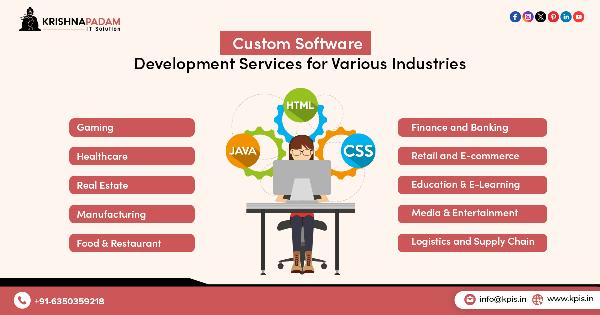
Healthcare
- In the healthcare industry, custom software manages unique challenges such as patient management, medical records, and compliance with regulations like HIPAA. Electronic Health Records (EHR), telemedicine platforms, and automated appointment systems are vital applications for the healthcare industry. It also enhances medical investigation and diagnostics with AI-driven tools.
Retail and E-commerce
- Retailers and eCommerce industries utilize custom software to improve customer experiences and optimize processes. They use custom e-commerce platforms, loyalty programs, inventory management systems, and personalized customer relationship management (CRM) solutions for better product tracking, customer behaviour analysis, and improved shopping experiences.
Education & E-Learning
- Educational institutions and EdTech businesses use custom education software such as E-learning platforms, Custom learning management systems (LMS), Student Information Systems (SIS), and Assessment Tools to enhance learning experiences and administrative efficiency. On the other hand, mobile apps and virtual classrooms enable institutions to deliver interactive e-learning solutions.
Finance and Banking
- The finance sector depends heavily on custom software to ensure security, compliance, and efficiency. It helps banks manage transactions, lending, risk assessments, and fraud detection through AI-driven tools and secure payment gateways tailored to compliance and regulatory needs.
Logistics and Supply Chain Management
- This industry used custom software to optimize routes, operate fleets, and provide convenient deliveries. It improves supply chain management with real-time tracking, automated fleet management, inventory optimization, and predictive analytics for improved decision-making.
Manufacturing
- Manufacturing industries benefit from custom software to improve productivity, manage supply chains, and ensure quality control. Vital applications include Enterprise Resource Planning (ERP), Supply Chain Management, Quality Control Systems, and Maintenance Management for improved operational efficiency and cost management.
Real Estate
- The real estate industry uses custom software for managing properties, transactions, and customer relationships. Applications include Property management systems, virtual property tours, Transaction Management, and custom CRM solutions that help real estate companies manage listings, track customer interactions, and facilitate sales strategy.
Gaming
- Custom game development software creates unique gaming experiences with personalized game mechanics, advanced analytics, and cross-platform integration for diverse platforms, like mobile, console, and PC gaming.
Media & Entertainment
- Custom software enables content streaming platforms, digital asset management systems, and interactive user experiences tailored to specific content delivery needs.
Food & Restaurant
- From restaurant management software to food delivery applications, custom software helps businesses manage orders, track inventory, and offer personalized experiences for both dine-in and delivery.
The Main Advantages of Developing Custom Software for Businesses in 2024
With the software, you may not only create a solution tailored to your requirements, but you can also boost productivity and efficiency. Let's check the numerous advantages that custom software development provides to businesses to support the idea that it could be the best choice for your organization:
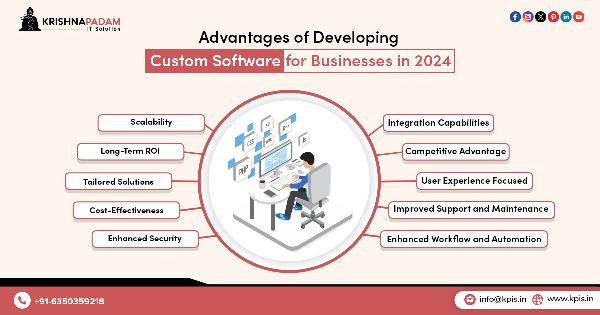
- Tailored Solutions: Unlike off-the-shelf software, custom software precisely addresses the demands of your company. It delivers a custom approach to problem-solving and goal-achieving.
- Scalability: Custom software scaled and adapted by businesses as they expand, ensuring that the technology will keep up with changing market trends and future requirements in 2024.
- Enhanced Security: They reduce the risk of data breaches and increasingly complex cyber threats by providing enhanced security standards for your organization.
- Competitive Advantage: Unique software solutions give businesses a competitive edge, allowing them to execute innovative features that stand out in the marketplace.
- Integration Capabilities: By integrating easily with third-party apps and current systems, custom software can increase efficiency and productivity for various platforms.
- Cost-Effectiveness: Custom software delivers long-term cost benefits by lowering license fees, reducing dependency on third-party services, and reducing workflow inefficiencies, even though the initial investment may be costlier.
- Improved Support and Maintenance- With custom software, businesses obtain reliable support and maintenance from the development team, ensuring convenient updates and troubleshooting.
- Enhanced Workflow and Automation- Businesses can boost productivity by automating repetitive tasks, optimizing workflows, and increasing overall efficiency with custom software.
- User Experience Focused- Tailored solutions are created with the end user in mind, providing a simple and intuitive interface that flawlessly complements the operations and objectives of the business.
- Long-Term ROI- By removing unnecessary features, custom software increases operational efficiency, reduces manual efforts, and produces a higher return on investment over the long run.
Building Your Vision: A Comprehensive Guide to Developing Custom Software Development in 2024
It might be exciting to consider a custom software solution meticulously designed to meet the individual requirements of your business. However, a straightforward procedure is essential to make that vision a reality. Here's a Comprehensive Guide to Developing Custom Software Development in 2024:
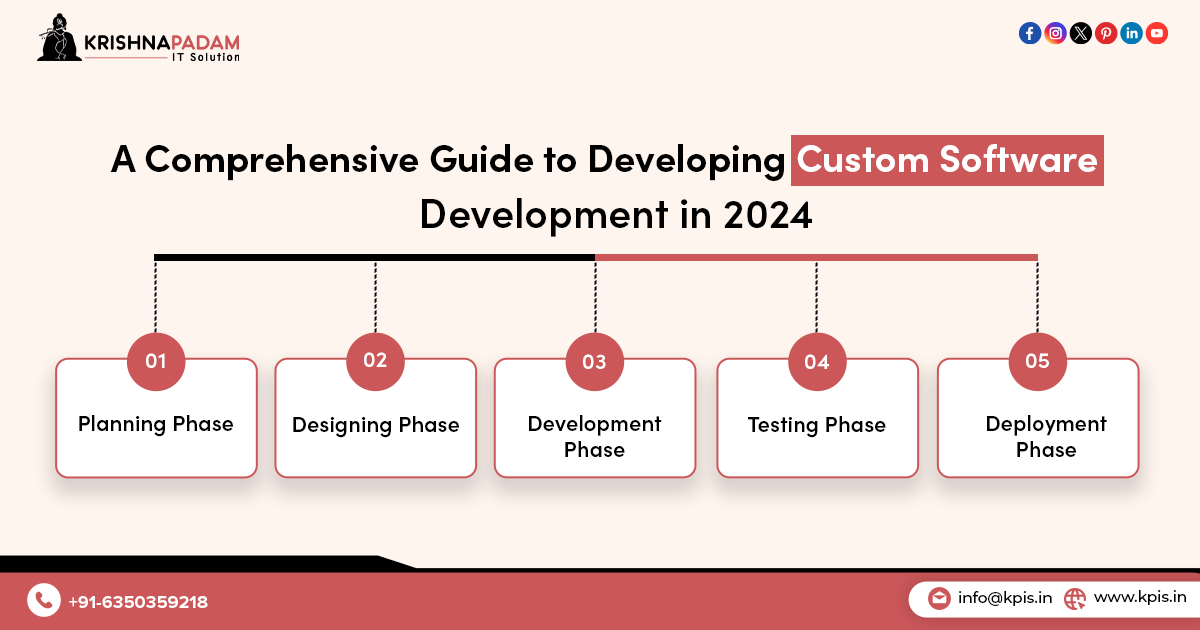
- Planning Phase:- Throughout this phase, the development team collaborates with the client to comprehend their needs. It involves gathering data regarding the organization's workflows, business procedures, and system requirements. After this, the custom software development team makes a project plan that recaps the software solution’s scope, timeline, and budget.
- Designing Phase:- This phase involves the development team collaborating with the organization to create the software solution user interface (UI) and functionality. To assist the business in visualizing the design of the software solution, page schematic, and mockups should created.
- Development Phase:- In this, the development team starts coding the software solution. This phase has other sub-phases, including testing, integration, and coding. The custom software development team ensures that the software is consistent with existing systems and tailored to the unique organization's demands.
- Testing Phase:- During this stage, the development team tests the software solution to ensure it fulfills the company's needs. Acceptance, integration, and unit testing are part of this phase.
- Deployment Phase:- The development team combines the software solution into the organization’s systems. There are some other sub-phases, such as training, configuration, and installation.
By following this comprehensive guide and keeping a collaborative mindset with your development partner, you may navigate the bespoke software development process. Ultimately, this will help you turn your vision into a powerful tool that propels your business forward.
How Much Does Custom Software Development Cost?
The cost of developing custom software is something that all those curious about creating digital products discover intriguing. It is hard to provide an exact estimate because the price of developing custom software differs significantly based on various variables.
Since businesses operate in various industries and have varied needs and goals. Here are vital battles in the features and functionality of bespoke solutions, which impact how much custom software development costs. For example, software created for healthcare businesses will serve completely different functions and have distinct features than software designed for the finance industry.
How Can KPIS Pvt. Ltd. Help with Custom Software Development?
Boost Productivity, Transform Your Industry, and Stay Ahead of the Curve
With years of experience in custom software development, KPIS offers comprehensive solutions to fulfill your business requirements. Our software development team ensures that your journey with custom software is smooth, revolutionary, and aligned with your strategic objectives. Businesses can use the newest technologies and agile processes to remain ahead of the competition, unleash new efficiencies, and meaningfully engage customers with our help.

The following are some ways that we can assist companies with their demands for custom software development:
- Professional Craftsmanship:- Using state-of-the-art technology and agile development processes, our talented developers team creates custom software development services that perfectly fit your unique needs.
- In-depth Dive into Your Requirements:- We fully grasp your objectives and difficulties through in-depth requirements analysis, ensuring each feature and functionality delivers real value.
- Tailored Solutions, Massive Impact:- This is not a one-size-fits-all situation. We design and develop custom software to combine with your existing systems and workflows. Consequently, it increases productivity and provides you with a competitive advantage.
- Agile for Adaptability:- Embrace transformation with enthusiasm. Our agile methodology enables ongoing input and modification, so your software is flawlessly aligned with your changing requirements.
- Forefront Usability:- A user-centric strategy is ineradicable in our culture. Our user-friendly interfaces empower and expedite the user experience.
- Constructed to Expand, Constructed to Last:- We provide software solutions that expand with your company. Scalability and seamless integration are built-in, providing your technology can manage whatever the future holds.
- Quality You Can Trust:- To build software that fulfills the highest standards and is robust, dependable, and secure, we place a great emphasis on stringent quality assurance and testing procedures.
- Our Mission is Your Success:- Our commitment doesn't stop at launch. To maintain, secure, and optimize your software and ensure that it keeps driving your business forward, we offer continuous support and maintenance.
In conclusion, custom software development gives companies a robust tool to perform their unique goals and obtain a competitive advantage in today's fast-paced market. Organizations can take new development opportunities and success by comprehending the complexities of custom software development, capitalizing on its benefits, and choosing the best software development company.
Contact us, and we'll assist you in turning your concepts into robust, creative solutions that propel your business forward.
FAQ’s for Custom Software Development:-
What is custom software development?
- Custom software development refers to the developing, designing, deploying process, and maintaining custom software applications to fulfil specific user requirements and business obstacles while giving them a competitive advantage.
What are the varieties of custom software development services?
- For a bespoke software project, there are several various development services you can consider, including product development, SaaS development, eCommerce development, software application development, and many more.
How much does custom software development cost?
- Generally, the custom software development cost depends on several elements, such as project scope, complexity, and on-demand features.
How much time does it usually take to develop custom software?
- Various timelines for developing custom software differ depending on the project conditions, scale, and complexity. The development process can take several months to more than a year to finish on average.
What are the advantages for companies that engage in the development of custom software?
- Businesses can benefit from custom software development in several ways, including operating efficiency, adequate data management and reporting, higher customer experiences, better interaction with current systems, and a competitive edge through customized and unique solutions.
Note: IndiBlogHub features both user-submitted and editorial content. We do not verify third-party contributions. Read our Disclaimer and Privacy Policyfor details.
Copyright © 2019-2025 IndiBlogHub.com. All rights reserved. Hosted on DigitalOcean for fast, reliable performance.












